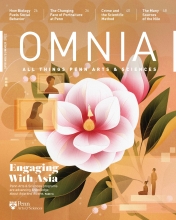Feeding an Open Mind
Grace Choi, C’23, aims to redefine food insecurity on college campuses.

“Dabbling” is what shallow water-feeding ducks do when they eat, dipping their heads below the surface to sample a wide variety of plants or insects.
The term also applies to the way Grace Choi, C’23, has approached her undergraduate experience.
“I’ll admit that my Penn career has been all over the place,” she says. “I am thankful that I have mustered the courage to dabble in so many different things, and that the school has the resources to help me explore all these fields, even those I might only be mildly curious about.”
Choi came into Penn as an anthropology major, aiming to study the subjects she loved—diverse cultures, languages, and histories—while recognizing that a liberal arts program would hone the critical-thinking skills essential to professions that also incorporated her passion for the sciences.
Finding opportunities to combine her personal and professional interests hasn’t been a problem. For example, last summer, Choi—a lifelong musician who plays several instruments and sings with Full Measure, Penn’s Christian a cappella group—devised an independent research project that evaluated music therapy’s effects on patients at Memorial Sloan Kettering Cancer Center. Participants listened to the music of their choice, then described the memories and feelings it evoked. Choi is currently in the process of coding their responses based on word patterns she identified.
“We know music has a lot of mental and physical benefits, but it is difficult to assess how successful an intervention is without numbers,” she explains. “I’m taking qualitative data and turning it into quantitative data so there is evidence to apply music therapy at a greater scale at the clinical level.”
“Staying home because of the pandemic gave me the freedom of time to take advantage of everything Penn has to offer.”
The same time she kicked off that project, Choi began working remotely with the South Africa-based Orion Organisation, which provides services for people with disabilities, through Penn’s Virtual Internships Abroad program. A far cry from her research activities, this position entailed helping the organization develop a budget plan.
“Staying home because of the pandemic gave me the freedom of time to take advantage of everything Penn has to offer. I could fit more into my days, and that inspired me to try more things, even if they were new to me and I had absolutely no idea what I was doing,” she laughs.
Beyond motivating her to explore an assortment of activities, the COVID-19 crisis inspired Choi to declare a second major in nutrition science at the beginning of her junior year. The three semesters she spent working virtually from her family’s house in Norwood, New Jersey, had given her perspective on what a luxury it was to have her parents providing her with fresh, home-cooked meals—like her mom’s savory Korean pancakes, called pa jun—while many people struggled to obtain food at all. Then, after returning to campus last August and living independently for the first time without a university dining plan, she suddenly found herself dining out or ordering takeout almost daily.
“As a college student, it is so hard to find time to cook or prioritize eating well,” says Choi, who decided to devote her Research Seminar in Anthropology to studying food insecurity on college campuses and promptly identified a gap in existing literature. Although many researchers had connected students’ socioeconomic statuses to their eating habits, almost none had gauged what dining options students had access to in the first place, or what factors drove their food choices.
Choi set out to answer these questions at Penn, surveying students on how and why they eat the foods they do. Responses showed that because of their fast-paced, atypical schedules, location and time governed most of their food choices, with fast food reigning supreme (particularly for older students without dining plans) and students skipping meals altogether if nothing quick was nearby.
“The pressures of academics and balancing many responsibilities at once push eating to be a last priority. Food security is not just about having enough to eat, but also what we eat, and students are choosing the fastest and most convenient things they can acquire rather than fueling their bodies with the right nutrients,” she says. “Food insecurity should be redefined and re-evaluated based on the specific context” of what’s readily available on university campuses.
To help students eat more healthfully, Choi would like to see more options for fresh fruits and vegetables and more nutritious “grab-and-go” meals and snacks across campus. She’s now eager to investigate career opportunities in the field of nutrition.
“Since I am very new to the nutrition world, I hope to dabble in research or get into a clinical setting to learn more about how people need help with the foods they eat,” she says. “Although I’m not sure what my future holds, I am very satisfied with my decision to add a new major.”



